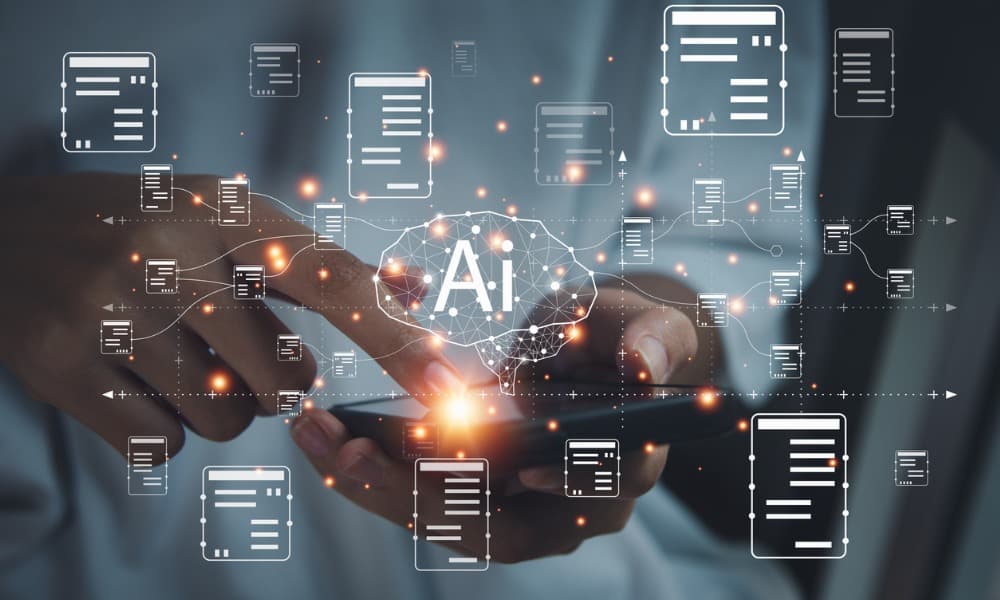An adaptive mindset is our best tool for adapting to change in business – and in life.
Key Takeaways:
- ChatGPT is changing the way we work and communicate.
- It’s not about replacing humans but enhancing how we work.
- ChatGPT works by creating human-like text, but it must be trained.
- Along with an adaptive mindset, we need agility and resilience.
We entrepreneurs are facing an evolving world, and an adaptive mindset is our most important asset to stay ahead – especially when it comes to technology. Tools like ChatGPT and artificial intelligence (AI) are changing the game, and we have to be ready.
Being able to adapt to change is an important part of running your life and your business. Having an adaptive mindset means we’re open to new ideas, rather than doing things a certain way because that’s the way we’ve always done it. An adaptive mindset means we see changes as they come, want to learn about them, and welcome what serves us.
An adaptive mindset goes beyond IQ and EQ to create entrepreneurial magic. Speaking of magic, ChatGPT is making quite the splash on the business landscape. Its longer name is “Chat Generated Pre-trained Transformer,” and it can truly be transformational for those with an adaptive mindset.
Let’s look at ChatGPT and what it can do, its real-world applications, its impact on communication, the ethics involved, and what having an adaptive mindset means in this digital age. Let’s get started.
What to know about ChatGPT
There’s no need to dig into the deep technical details, but we should know a little about how ChatGPT works. It uses deep learning, which is a subset of machine learning, to create human-like text via transformer neural networks. That means:
- It can respond to questions as well as compose written content like articles, social media posts, and email.
- ChatGPT predicts text. Think of when you begin to type something into Google. It will often fill in the next word or an entire phrase for you.
- It is useful in business to draft reports based on meeting notes, create an article summary, or convert your notes into a brief.
- You can use it to create outlines and generate SEO-friendly keywords, as well as create content.
- Need help brainstorming? ChatGPT can work as both a tool and sounding board by responding to questions with useful information sources.
- Want to automate customer service emails? It can do that, too.
- Need help developing interview questions? ChatGPT can help create relevant batches.
All you need is a web browser and an OpenAi account. Getting all the advantages from ChatGPT takes some time because you need to provide it with instructions, but the most important thing is approaching it with an adaptive mindset.
Why an adaptive mindset matters
Your mindset matters, because it can either unlock transformation or leave you stuck in the same rut. It’s important to have a mindset that copes with and thrives on change and responds positively to challenges, especially in an age when technology is constantly growing and new innovations are coming at a rapid pace.
An adaptive mindset:
- Empowers you, your staff, and your entire organization
- Improves wellbeing and reduces burnout
- Helps us connect with others authentically
- Improves team environments
- Gives a people-first message, even in the context of technology
Adaptive leadership has been around for a long time, too. Abraham Lincoln was an adaptive leader who saw a lot of criticism and debate, and General George Patton used it to anticipate trouble and create backup plans.
How an adaptive mindset helps us navigate change
As entrepreneurs, we’re used to uncertainty. But an adaptive mind embraces it as part of the process of continuous learning, cultivating resilience and agility, and innovation. Have a growth mindset, build a supportive network, practice self-care, and develop problem-solving skills, and you’ll be on your way to discovering purpose and meaning to help you also develop resilience.
You also need agility if you want to take advantage of opportunities in this fast-changing world. Take cues from agile software development and develop a mindset that focuses on understanding, collaboration, learning, and flexibility.
What does all of this have to do with ChatGPT? We need the right mindset to take advantage of everything it offers now and will offer in the future. Technology has, and will continue to have, a huge impact on our businesses. But we’ll still need human beings – the objective is enhancement, not replacement.
ChatGPT and how it impacts human communication
AI is a “collaborative intelligence,” which means it is designed to work with and enhance the strength of both the technology and humans. Humans perform a crucial role – training machines, explaining outcomes, and sustaining their responsible use. In return, these machines can boost our thinking and improve and automate some of our day-to-day interactions.
- ChatGPT can break down barriers, translate articles and emails into new languages, and promote inclusivity.
- It can help with personalization to streamline communication.
- It can analyze the effectiveness of your communications and show you what you might want to change.
- It can leverage data insights to optimize customer service and internal communication.
But AI is a double-edged sword. These systems collect and process huge amounts of data, and that can raise concerns about privacy and security. You need to have robust data protection in place to keep you and your customers safe.
Ethical concerns about ChatGPT
AI creates a number of ethical concerns, and our greatest weapon against ethics issues is transparency. We must be transparent about which algorithms are used in our organization, their decisions, and what data is being used. There also must be accountability, as everyone using an AI system should be accountable for how they use it or misuse it.
It’s also important to remember that AI systems learn from us. We train them, and that means there’s a risk of bias. Bias creeps in with training data that includes biased human decisions – so we need to be careful when taking on those processes.
Helping employees develop an adaptive mindset
Our brains are hardwired to resist change. That change is amplified for AI and ChatGPT by doomsayers who think human workers will become obsolete.
We need to encourage our employees to have an adaptive mindset by transparently communicating that AI is a collaborative tool trained by humans, and that it offers a lot of benefits. Here are some tips for how to do that:
- Involve employees from the start of the decision-making to give them a sense of ownership.
- Support employees with all the training they need to understand and use AI tools.
- Clearly communicate the goals and expectations that come with AI adoption.
- Create dialogue that encourages everyone to ask questions and share their emotions and insights.
Storytelling is another great option. There’s no better way to show the positive impact of change than with a success story. Share with your team that studies are showing tools like ChatGPT increase productivity by 66%, boosting the value created per worker for every hour they work. This can lead to less time on tasks that add little value, more time for what matters, or even create time for upskilling and career development.
ChatGPT is here to stay, and each iteration provides more tools that will forever change the way we work and live. That’s why we must develop an adaptive mindset. Without one, we won’t be able to seize the opportunities to enhance how we work and how we think.
At the Profit Recipe, we’re in the trenches and approaching ChatGTP, AI, and whatever technology comes next with an adaptive mindset – which is essential to lead by design. It takes self-awareness, vulnerability, and agility.
We’ll work with you to understand and develop the leadership skills you need for success. We’ve been there, done that, and learned valuable lessons along the way that we’re eager to share. Join our community of entrepreneurs and share your own experiences to help yourself and others navigate the leadership journey.
We’re here for you and because of you. Let us support your entrepreneurial journey – schedule a call with one of our experts today or send us a message.



